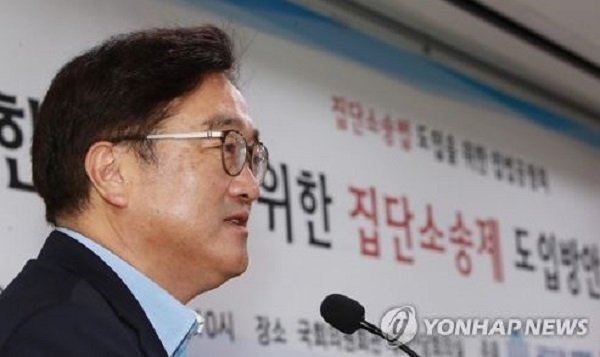A senior ruling party official Wednesday rejected conservatives' growing calls for the redeployment of US tactical nuclear weapons to South Korea, saying it would amount to recognizing the North as a nuclear power.
During a radio interview, Woo Won-shik, the floor leader of the Democratic Party, also warned that the redeployment could also provoke China and Russia, spark an arms race in Northeast Asia and thus destabilize the Korean Peninsula.
Amid heightened tensions triggered by the North's repeated missile tests and bellicose rhetoric, the main opposition Liberty Korea Party has demanded the redispatch of the US arsenal, which was withdrawn following an inter-Korean declaration for a nuclear-free peninsula in 1991.

Woo Won-shik, the floor leader of the ruling Democratic Party, speaks during a forum at the National Assembly in Seoul on Aug. 16, 2017. (Yonhap)
"If the LKP claims the need for the redeployment, (South Korea) will immediately fall into a case of self-contradiction as it would be like making the North's nuclear-armed status a fait accompli," Woo told local broadcaster CBS.
"The main opposition party must not make dangerous remarks without serious consideration just to oppose the government's policy line," he added.
Woo went on to say that the call for the redeployment is a "claim that would benefit the North."
"If we recognize the North as a nuclear-armed state, then it would become a de facto nuclear power. How can we then demand the North's dismantlement of its nuclear program?" he said.
The liberal Moon Jae-in government has pursued a peaceful resolution of the North's nuclear conundrum based on its two-pronged policy of sanctions and dialogue. But the LKP has railed against the policy, calling on the government to take more stringent measures, such as pursuing a "nuclear balance of power" with the North.
Touching on the criticism, Woo urged the opposition parties to stop any political moves that would undercut Seoul's negotiating power in future talks with the reclusive regime.
The politician also called on the North to stop its provocative acts and rhetoric, and discard its "adventurous thinking," stressing that only its denuclearization and change in its behavior would guarantee its future. (Yonhap)






